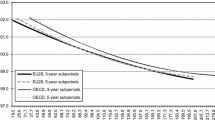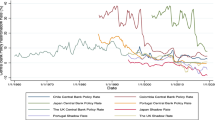Abstract
This paper examines the relationship between financial stability, monetary policy, and economic growth in 40 developed and developing countries by using the annual panel data over the period of 1993–2015. Fixed and random effects panel data regression models were fitted to determine the impact of financial stability and monetary policy on economic growth. Our results indicate that trade openness, capital account openness, and foreign direct investment have positive impacts on economic growth with a high degree in developed countries. Our empirical results also indicate a positive and significant impact of research and development on financial development as well as economic growth in developed countries. Financial crises, bank liquid reserves, and bank nonperforming loans affect negatively financial stability, financial development, as well as economic growth. This impact essentially amounts to the sensitivity and fragility of the banking system. In addition, inflation continues to affect economic growth in a negative way. The main findings confirm the complementarity and the importance of real, financial, monetary variables and bank solidity as well their significant impacts on financial stability and economic development.
Similar content being viewed by others
Notes
We used the Blundell and Bond methods (1998) to correct the problems of autocorrelation and homoscedasticity.
References
Aglietta, M. (2003). Le risque systémique dans la finance libéralisée. Revue d’Economie Financière No 70 (Janvier), 33–49.
Atje, R., & Jovanovic, B. (1993). Stock markets and development. Eur Econ Rev, 3, 632–640.
Beck, T., Levine, R. (2001). Stock markets, banks, and growth: correlation or causality. World Bank Policy Research Working Paper No 2670. Carlson School of Management Working Paper.
Beck, T., & Levine, R. (2004). Stock markets, banks and growth: panel evidence. Journal of Banking and Finance, 423–442.
Beck, T., Levine, R., & Loayza, N. (2000). Finance and the sources of growth. J Financ Econ, 58(1–2), 261–300.
Bekaert, G., Harvey, R., & Lundblad, C. (2005). Does financial liberalization spur growth? J Financ Econ, 77, 3–55.
Belka, M. (2009a). The impact of the crisis on new EU member states: role and contribution of the Fund in the Crisis. IMF Publications, 1.
Belka, M. (2009b). The global economic crisis is testing the cohesion of the European Union. IMF Publications Finance and Development, 2.
Blundell, R., & Bond, S. (1998). Initial conditions and moment restrictions in dynamic panel data models. J Econ, 87, 115–143.
Borenztein, E., De Gregorio, J., & Lee, J. W. (1998). How does foreign direct investment affect economic growth? J Int Econ, 45(1), 115–135.
Cali, M., Massa, I., & te Verde, D. W. (2008). The global financial crisis: financial flows to developing countries set to fall by one quarter. London: Mimeo, ODI.
Demirgüç-Kunt, A., & Detragiache, E. (1998). The determinants of banking crises in developing and developed countries. IMF Staff Pap, 45(1), 81–109.
Detragiache, E., Spilimbergo, A. (2001). Crises and liquidity: evidence and interpretation. Document de travail du FMI 01/2. Washington, DC. http://www.imf.org/external/pubs/ft/wp/2001/wp0102.pdf.
Devarajan, S., Swaroop, V., & Zou, H. (1996). The composition of public expenditure and economic growth. J Monet Econ, 37(2), 313–344.
Dhameja, N. (2010). Financial crisis: impact, challenges and way out. Indian Journal of Industrial Relations, 45(3), 11–16.
Dietz, T., Protsky, T. (2009). The financial crisis in Germany and Ukraine-reasons, development and countermeasures. www.businessperspectives.org/books/.
Eggoh, J. C. (2010). Développement Financier, Instabilité Financière et Croissance Economique : un Réexamen de la Relation. Région et développement, 32, 9–29.
Guillaumont S., Kpodar, R. (2004). Développement financier, instabilité financière et croissance économique, Document de travail de la série Etudes et Documents E 2004–13. CERDI.
Henry, P. (2000). Do stock market liberalizations cause investment booms? J Financ Econ, 58, 301–334.
Hung, F.-S. (2001). Inflation, financial development, and economic growth. International Review of Economics & Finance, 12(1), 45–67.
Hung, F.-S. (2009). Explaining the nonlinear effects of financial development on economic growth. J Econ, 97(1), 41–65. doi:10.1007/s00712-008-0057-4.
Jacquet, P., Pollin, J. (2007). Systèmes Financiers et Croissance, Document de Recherche LEO, No 2007–23.
Kaminsky, G., & Reinhart, C. (1999). The twin crises: the causes of banking and balance-of-payments problems. Am Econ Rev, 89(3), 473–500.
King, R., Levine, R. (1992). Financial indicators and growth in a cross section of countries, policy research. World Bank, Working paper 819.
King, R., & Levine, R. (1993). Financial intermediation and economic development. J Monet Econ, 32(3), 513–542.
Levine, R., & Zervos, S. (1996). Stock market development and long-run growth. World Bank Econ Rev, 10, 323–339.
Levine, R., & Zervos, S. (1998). Stock markets, banks, and economic growth. Am Econ Rev, 88(3), 537–558.
Loayza, N., Ranciere, R. (2004). Financial development, financial fragility, and growth. CREI Working Papers, WPS 3431.
Marco, A. (2008). Does insurance market activity promote economic growth? A cross-country study for industrialized and developing countries. Journal of Risk and Insurance, 75(4), 921–946.
Mario, I. B. (2006). Economic growth and the stability and efficiency of the financial sector. Journal of Banking and Finance, 30(12), 3429–3432.
Rioja, F., Valen, N. (2002). Finance and the sources of growth at various stages of economic development. University of Georgia State, Andrew Young School of Policy Studies, Working paper, 2–17.
Staehr, K. (2010a). The impact of the global financial crisis on the new EU countries. Working papers, 2, 12–15.
Staehr, K. (2010b). The global financial crisis and public finances in the new EU countries from Central and Eastern Europe. Bank of Estonia, Working Paper Series, 22.
Stephen G., Enisse, K. (2012). Reassessing the impact of finance on growth. BRI, Working paper No 381.
Stephen G., Enisse, K. (2015). Why does financial sector growth crowd out real economic growth? BRI, Working paper.
Tadesse, S. (2002). Financial architecture and economic performance: international evidence. J Financ Intermed, 11, 429–454.
Terazi, E., & Senel, S. (2011). The effects of the global financial crisis on the Central and Eastern European Union Countries. International Journal of Business & Social Science, 2(17), 186–192.
Tezcan, E. (2009). The global financial crisis and the European Union, 16 July 2009 Turkish Weekly www.turkishweekly.net.
Wahyoe, S., Fouad, M., & Amine, T. (2011). Bank market power, economic growth and financial stability: evidence from Asian banks. Journal of Asian Economics, 22, 460–470.
Wan-Chun, L., & Chen-Min, H. (2006). The role of financial development in economic growth: the experiences of Taiwan, Korea, and Japan. Journal of Asian Economics, 17, 667–690.
Author information
Authors and Affiliations
Corresponding author
Appendix
Appendix
Rights and permissions
About this article
Cite this article
Younsi, M., Nafla, A. Financial Stability, Monetary Policy, and Economic Growth: Panel Data Evidence from Developed and Developing Countries. J Knowl Econ 10, 238–260 (2019). https://doi.org/10.1007/s13132-017-0453-5
Received:
Accepted:
Published:
Issue Date:
DOI: https://doi.org/10.1007/s13132-017-0453-5




